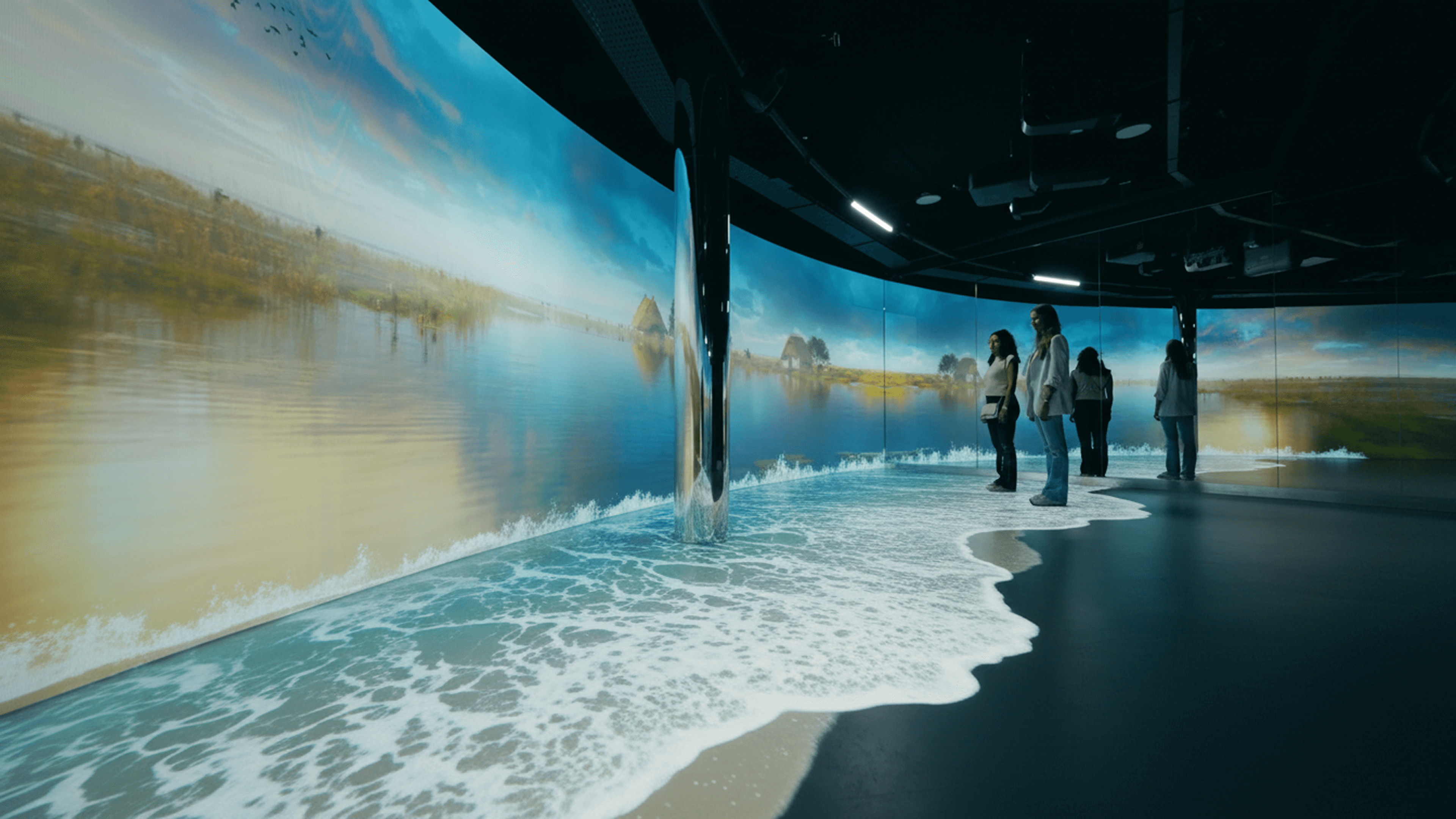.04
Pillars
THE NEW FRONTIER OF CONTENT
How large-scale screens, experiential design, and cinematic storytelling are reshaping how we experience the world.
Immersive content is no longer a niche experiment reserved for futurists, art collectives, or tech expos. It has entered the mainstream—on our streets, in our stores, at our events, and inside the cultural spaces we visit. Screens are getting bigger, environments are becoming more responsive, and audiences increasingly expect to step into a story rather than just watch it.
But what exactly is “immersive content”? Why is it expanding so fast? And where is it heading?
What Is Immersive Content?
Immersive content blends storytelling, design, and technology to create experiences where viewers feel surrounded by the narrative. It goes beyond traditional film or animation by placing visuals inside physical spaces, through massive LED walls, spatial sound, projection mapping, interactive systems, or even architectural media.
At its core, immersion is not about hardware. It’s about creating presence: the sensation that the content is part of the world around you.
.02
Ikea Dromland
How Immersive Media Is Being Used Today
Over the past decade, Woodwork Amsterdam has helped shape this space, producing cinematic and system-driven content for some of the world’s biggest media stages:
.03
Vans the knu stack
1. DOOH & Anamorphic Billboards
The rise of global mega-screens has transformed city squares into storytelling canvases. We contributed to this evolution with projects such as:
Vans DOOH Campaign in Manhattan
Visa DOOH in Riyadh’s Times Square
.04
World of Wellbeing
2. Event Visuals & Opening Shows
Events have become immersive worlds of their own. Brands and institutions rely on large-scale visuals to make an emotional impact in seconds.
We’ve crafted full show-openers for:
WOW – Energising the audience through show graphics and openingsfilm
Alibaba – opening up for Jack Ma keynote on Finance day
The Morpheus Hotel in Macau – where architecture and storytelling meet in a dramatic, high-end opening performance.
When thousands of people enter a hall, the visual environment sets the tone, it signals ambition, energy, and identity before a single word is spoken.
3. Retail & Spatial Brand Worlds
Immersive walls and reactive spaces are changing how brands communicate in-store. For G-Star, Woodwork created a massive in-store LED installation that turned the retail floor into a cinematic world aligned with the brand’s identity.
Retail is no longer static. It’s experiential, emotional, alive.
4. Permanent Immersive Experiences
More institutions are investing in long-term immersive spaces. We helped shape two of the Netherlands’ major immersive attractions:
REMASTERED – a multi-room digital art experience.
Euromast – transforming a Rotterdam landmark into a sensory narrative above the city.
These installations have become part of the public cultural fabric—destinations in themselves.
.06
Euromast
Why Big Screens Are Booming
Walk around any city today, Amsterdam, Seoul, New York, Dubai and you’ll see the shift:
LED technology is cheaper and more flexible.
Architects now plan media surfaces into buildings.
Brands compete for attention in oversaturated environments.
People crave memorable moments worth sharing.
The result? Bigger canvases, more creative formats, and content that moves with the environment.
Screens aren’t just displays, they’re becoming architectural elements.
How Storytelling Is Changing
As the format evolves, content must evolve with it:
Narratives become spatial, not linear.
Design must consider scale, movement, and viewer perspective.
Immersion becomes emotional, not just visual.
Storytelling is no longer about directing a viewer’s gaze, it’s about surrounding them with purpose, intention, and atmosphere.
This requires a different creative process:
thoughtful concept → precise system → bespoke content.
Not randomness, not “AI guesses,” but art direction with intention.
.08
Visa DOOH — STORYBOARDING
The Impact of Immersive Content
Culturally
Immersive installations become landmarks, connecting communities and redefining city identity.
Economically
Experiences increase foot traffic, extend dwell time, boost brand recall, and attract tourism.
Creatively
It pushes designers, filmmakers, animators, and technologists to work beyond traditional mediums, inspiring new forms of expression.
Emotionally
When done right, immersive environments create presence,
a feeling that stays with people long after they’ve left.
Future Forecast:
Where Is It Going?
The next wave of immersive experiences will be driven by:
.01
More Architectural Media Integration
Buildings as canvases. Interiors as dynamic surfaces.
Media embedded directly into city infrastructure.
.02
System-Based Content
Data-driven, generative, adaptive content that evolves over time.
Not one-off films, but living visuals.
.03
Hybrid Physical–Digital Spaces
Retail, museums, offices, events—merging storytelling, architecture, and interactivity.
.04
Purpose-Driven Experiences
Not everything needs to be spectacular.
The future lies in meaningful, intentional immersion—educational, emotional, poetic.
.05
The Rise of Creative Control Over AI
AI will play a huge role, but only when guided by clear artistic direction.
The future belongs to studios that can combine:
Human vision
System thinking
AI production
Cinematic craft
…into one cohesive creative process.
.09
3D BILLBOARD ADGP
Immersive content is not a trend; it’s a shift in how we tell stories in the real world.
As screens become larger and more integrated into our surroundings, the need for purposeful, crafted, emotionally intelligent content will only grow.
For over twenty years, Woodwork Amsterdam has been shaping that evolution—bringing cinematic storytelling, design precision, and imaginative world-building to spaces around the globe.
The next frontier is already here.
And it’s immersive.


















